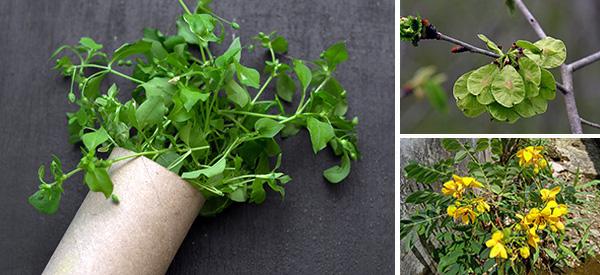
10 Natural Laxative Herbs
Constipation feels terrible. Defined as having fewer than three bowel movements per week, it leaves you bloated, uncomfortable, and even in pain. All you want is a relief- but what can work?
There are 10 herbs that serve as natural laxatives. Let’s take a closer look at what they are, how to identify them, their overall medicinal benefits, and how you can use them to relieve constipation.
1. Alder Buckthorn (Rhamnus frangula)
Alder buckthorn (not to be confused with European buckthorn) is a tall shrub found in parts of Europe and North America. The exterior bark is dark brown and reveals a bright yellow inner bark when cut. In addition to constipation, it has traditionally been used to treat abdominal bloating and liver conditions such as cirrhosis, jaundice, and hepatitis.
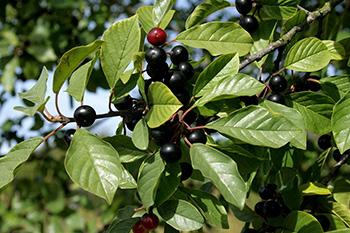 This bark works as a laxative by stimulating your intestines, but you must use dried bark that has been heat-treated or is at least a year old. (When fresh, it can cause vomiting.) The typical dose is 0.5 to 2.5 grams, which you can take on its own or as a tea by steeping the bark for at least five to 10 minutes in 3/4 of a cup of boiling water and then straining.
This bark works as a laxative by stimulating your intestines, but you must use dried bark that has been heat-treated or is at least a year old. (When fresh, it can cause vomiting.) The typical dose is 0.5 to 2.5 grams, which you can take on its own or as a tea by steeping the bark for at least five to 10 minutes in 3/4 of a cup of boiling water and then straining.
Alder buckthorn should not be taken for more than seven to 10 days. Any longer and your body could start depending on it to have a bowel movement.
2. European Buckthorn (Rhamnus cathartica)
European buckthorn (not to be confused with alder buckthorn) is a small tree native to Europe, northwest Africa and western Asia. It is also found in parts of North America after being introduced as an ornamental shrub in the early 19th century.
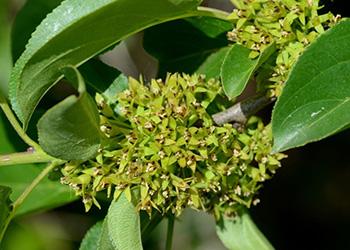
It can be identified by its oval leaves and yellowish-green flowers.
How to use it: As a herbal therapy, European buckthorn berries are primarily used to treat constipation. Steep two to four grams of the berries in 3/4 of a cup of boiling water for 10 to 15 minutes before straining and consuming as tea at bedtime.
If needed, the tea may also be consumed in the morning and afternoon. Do not use it for more than 10 days.
3. Rhubarb (Rheum rhabarbarum)
Europeans started using rhubarb as a medicinal treatment sometime before the 18th century. Today, you can find it in cooler climates everywhere. Its thick stalks vary in color from crimson red to speckled pink and light green.
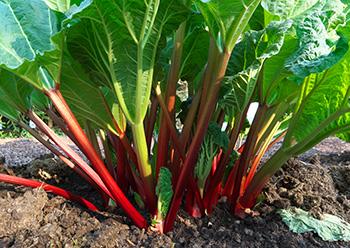
In modern times, rhubarb is best known as a pie ingredient, but you can use it to treat constipation. Due to its antioxidant properties, rhubarb consumption can also present a line of defense against health problems like diabetes, heart disease, and cancer.
How to use it: You can consume rhubarb in a variety of ways, from sprinkling chopped-up raw stalks on salads to adding dried rhubarb to your favorite herbal tea recipe. However, use it as a constipation treatment for a short period, as its tannin content gives it anti-diarrheal effects.
4. Senna (Senna alexandrina)
Senna, which has been used as a herbal remedy for centuries, can be found in Egypt, Sudan, India, and Somalia. It is a shorter shrub-like plant with large yellow flowers and pods that contain around six seeds each.
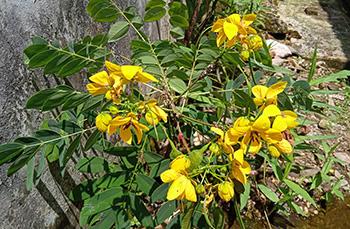
Senna contains chemicals called sennosides, which have a laxative effect. In addition to relieving constipation, it has been used to treat irritable bowel syndrome, hemorrhoids, and anal fissures.
How to use it: Both senna leaves and pods can relieve constipation. Steep one or two grams of dried leaves in hot water for 10 minutes and strain. With dried pods, use 1 teaspoon per cup of boiling water and let brew for 10 minutes. It is important to note that senna should only be used in the short term, as long-term consumption can cause liver damage.
5. Slippery Elm (Ulmus rubra)
Slippery elm is native to eastern North America. It is distinguished from American elm by its brown hairy buds, the hair on its twigs, and the slimy inner bark that inspires its name.
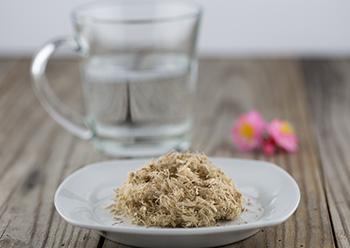
Long used to treat constipation, slippery elm stimulates the nerves in your gastrointestinal tract, resulting in mucus production. Its soothing properties have made it a key herbal treatment for sore throats and upset stomachs as well as a topical application for wounds, burns, and skin inflammation.
How to use it: Once the inner bark is dried, you can crush it into a fine powder and make a tea by adding approximately two tablespoons of the powder to two cups of boiling water and letting it steep for a few minutes. If you are on any medication, take it separately, as slippery elm coats the GI tract and can reduce the absorption of some medications if taken together.
6. Peppermint (Mentha piperita)
A cross between spearmint and watermint, peppermint is cultivated across the world and can even be found in the wild along with its parent species. It is a perennial plant characterized by its fuzzy leaves and stems and purple flowers. You can find it in moist locations, such as along drainage ditches and streams.

How to use it: Peppermint tea is one of the most popular natural remedies for digestive issues like constipation. To make it, boil two cups of water, add 15 fresh peppermint leaves (rub them in your hands first to get the oils flowing), and steep for 10 to 15 minutes.
If you prefer tinctures, crumble a handful of fresh peppermint leaves, place them in a glass pint jar, pour a cup of vodka over them, and store it for at least two months in a cool, dark place. When you feel constipated, add two to three drops into a glass of warm water and drink.
7. Ginger (Zingiber officinale)
Ginger is a plant whose root is widely used as a spice and a herbal remedy for conditions like constipation. The flowers have pale yellow petals with purple edges. It should not be confused with wild ginger (Asarum canadense). Unlike many herbs, it is a cultigen and does not exist in a wild state.
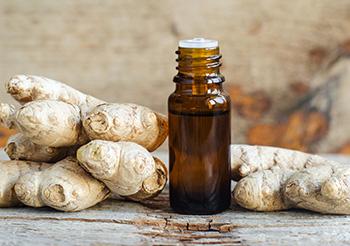
Ginger root tea can help if your constipation stems from poor digestion. If you’ve had a heavy meal, peel and slice one tablespoon of fresh root and boil it in two cups of water for at least 10 minutes. The resulting tea can also reduce nausea and help fight colds and flu.
How to use it: To make a tincture, fill a jar halfway full with chopped ginger, top it with vodka, and store it in a dark place for around two weeks, shaking periodically. Then strain and use. The recommended dosage for adults is three full droppers three times a day.
8. Dandelion (Taraxacum)
Dandelions are easy to distinguish by their bright yellow heads and serrated leaves. They also happen to be extremely nutritious, with raw greens containing high amounts of Vitamins A, C, and K.
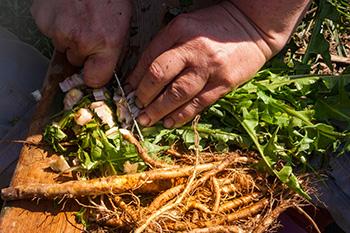
Dandelion is used in traditional herbal medicine to treat constipation and other symptoms of digestive problems. The root is a rich source of inulin, a prebiotic fiber that can reduce constipation and increase intestinal movement. Being full of potent antioxidants, dandelion can also be used to fight cellular damage in your body.
How to use it: To make dandelion tea that can double as a natural laxative, boil a quart of water in a pot and add two tsps of diced root. Cover the pot, lower the heat, and steep on the stove for one minute before removing it from the burner and continuing to steep for 40 minutes. Strain and serve.
To make a tincture for the winter months, fill a mason jar two-thirds full of chopped roots and cover it with vodka. Store it in a cool, dry place, shaking occasionally, and wait at least a month before using. To treat digestive issues, take 10 drops in water every hour until the condition improves.
9. Licorice Root (Glycyrrhiza glabra)
The licorice plant is native to Western Asia, North Africa, and southern Europe. It can grow up to a meter in height, has flowers that range in color from purple to pale blue, and features oblong pods with several seeds.

Licorice root is a popular remedy for digestive issues due to its anti-inflammatory properties. Its potent antioxidant and antimicrobial effects have also made it a herbal option for those suffering from ulcers, upper respiratory infections, and skin conditions like eczema.
How to use it: Drinking licorice root tea can soothe your digestive system and encourage bowel movement. It’s simple to make: boil four ounces of water, add a teaspoon of dried licorice root, and remove from heat to steep for five minutes. Strain and then drink. Because over-consumption of licorice root may cause side effects, limit your intake to half a cup of tea per day.
10. Marshmallow Root (Althaea officinalis)
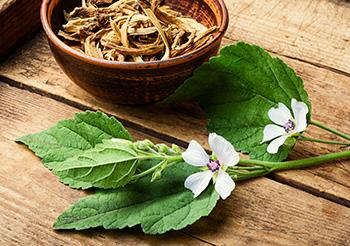
Marshmallow root is native to Europe, Western Asia, and Northern Africa. It is a mid-sized perennial with velvety leaves and small, pale flowers. The leaves, flowers, and roots have traditionally been used to treat mucous membrane irritation, such as gastric ulcers, and drinking tea at bedtime can relieve constipation.
How to use it: To make marshmallow root tea, add a cup of boiling water to two teaspoons of dried root and steep for 10 minutes. Like slippery elm, it has mucilage that coats and soothes an irritated digestive system and can facilitate a bowel movement.
Conclusion
Long before doctors were writing prescriptions to treat constipation, people were turning to their gardens and to nature for relief. These natural laxative herbs can help during those times when drinking a lot of water, eating plenty of fiber, and getting regular exercise don’t eliminate the problem.
You may also like:
How To Do A Natural Gallbladder Flush
How to Make A Weight Loss Tonic
DIY Colon Detox with Ingredients You Have in Your Kitchen Right Now


Doctors 200 years ago also used Cape Aloe for constipation issues
Hi Tom,
Cape aloe also acts as a natural laxative‚ decreasing the amount of time it takes for waste to move through your colon. However, you have to be very careful with the dosage as it’s considered a harsh stimulant laxative and is likely unsafe in high doses.
Many blessings and good health!
Excellent. Thank you for posting this information. I am always looking for ways to get back to nature to find healthier ways to treat our bodies.
Hi Maureen,
Thank you for your interest in our work.
It brings us great joy to read comments like yours.
Many blessings and good health!
What can i use instead of alcohol to make ginger tincture or any tinture
Hi Jose,
You can use Apple Cider Vinegar instead. More details in the article below:
https://thelostherbs.com/how-to-make-a-tincture-using-apple-cider-vinegar-instead-of-alcohol/
Many blessings and good health!
Do you know of anything that helps with Tinitus?
Hi Shelley,
Thank you for reaching out to us.
You can read more about the natural ways to heal tinnitus here:
https://thelostherbs.com/8-natural-ways-to-heal-tinnitus/
Many blessings and good health!
Vodka is not natural!